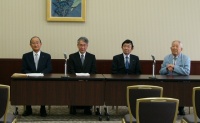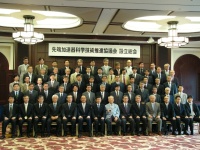 |
 |
|||||||||||||
|
|||||||||||||
|
|||||||||||||
|
On June 11, the executive officers of leading Japanese companies, important dignitaries, and a physics Nobel Prize winner gathered at Kasumigaseki, Tokyo, Japan to celebrate the establishment of a forum for promotion of advanced accelerator technology and science (official English name yet to be determined). The forum aims to develop the structure which will be the core of the industry-government-academia alliance to pursue R&D for next- generation accelerators. The organising committee was formed by Mitsubishi Heavy Industrial Ltd. (MHI), Toshiba, Hitachi, Mitsubishi Electric Co., and KEK. Companies from across various industries, laboratories and universities — a total of 76 bodies — participate in the association, and the number of participants is expected to increase.
Takashi Nishioka, Director, Senior Corporate Adviser of MHI who chairs the forum, said at the press briefing: “Establishing this association is truly significant for Japan, the country which wants to become one of the world leaders in science and technology. Strengthening the alliance between industry, government, and academia through the forum will enable Japan to acquire competences in cutting-edge technology fields.” The "advanced accelerator" is defined as an accelerator which has the best possible performance. Identified key technologies to realise such an advanced accelerator are acceleration with superconductivity, nanobeam generation and control, and detector technology which will yield the information needed to unravel the Quantum Universe. All these technologies are essential for upgrading J-PARC, the proton accelerator which has just started its operation at Tokai village, Ibaraki prefecture in Japan, for the development of the Energy Recovery Linac, the next-generation light source, and of course for the ILC. The forum wants to enhance collaboration between industry and laboratories and coordination at the higher management level, with involvement of company executives and experts from various fields. Another aim is the creation of new form of industry-government-academia alliance, considering the ILC as a model project. Kaoru Yosano, former chief Cabinet secretary, and newly appointed Supreme Advisor of the forum, said: “The advanced accelerator project will require a long period of time. The important thing is persistence and advancing step by step from one level to the next. I believe that this effort promises us a better future Japan.” Yosano, who chairs the Federation of Diet members to promote the International Linear Collider project, also stated that the Federation will be renewed with cross-party group of Diet members. This will be the first time that Diet members form such a federation in the field of basic science. One key activity of the forum for FY08 will be communication. Research in basic science has made big impacts on society, but this was not often recognised since most of them were indirect. Because of this, the forum recognises the importance of communication in order to gain broad support from society to promote activities in basic science. Masatoshi Koshiba, Nobel laureate and the Honorary chairman of the forum, said: “I would like younger generations to have the chance to touch and feel basic science. Reading a book or listening to scientists' talks won't be enough,” showing his expectation for the forum's communication activities. The forum will form specialised groups for planning and implementation of each task, combining the expertise and experiences each member has. An intellectual property study group will conduct studies regarding intellectual property rights and its management, applying the experience from International Thermonuclear Experimental Reactor project (ITER). The Technology study group will seek possible applications of technologies derived from R&D on advanced accelerators in various field such as new materials, biology, global warming, or medical applications. The Communication group will plan and implement outreach events such as symposiums or talk shows and will launch the web site to gain public understanding. The official activity starts in two weeks. -- Rika Takahashi |
|||||||||||||
| © International Linear Collider |

